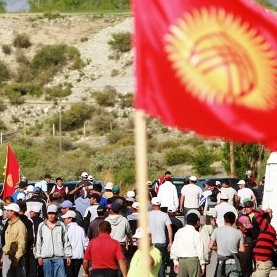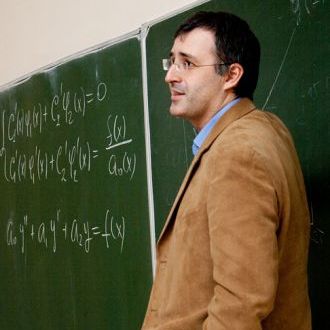A wave of unrest hit Kyrgyzstan last week, creating two “hot” zones, one in northern Issykkul and another in southern Jalalabad. The events turned dramatic, illustrated by the president decreeing a state of emergency in the Jeti Oguz district of Issykkul as well as the protesters' implementation of a “people's governor” in Jalalabad.
A crowd of several hundred protesters blocked the road leading to the Kumtor gold mine, and on May 31 they cut the power supply to the mine. Clashes between protesters and law enforcement groups resulted in several people injured. The readiness of the protesters to confront the police led to the president’s announcement of the state of emergency in the district.
The protesters demanded immediate cancellation/denunciation of the existing agreement with Canadian Centerra Gold, which operates the mine. The protesters also put forth some progressive social and environmental demands, and sought some forms of compensation from the mining company.
As the events in Jeti Oguz turned violent, a large crowd gathered in the southern town of Jalalabad, expressing solidarity with the anti-Kumtor protesters and also demanding the immediate release of three MPs who were recently jailed for an alleged effort to forcefully seize power. The group of protesters acted swiftly, occupying the governor’s building and announcing a new governor, the “people’s governor.”
Not surprisingly, the authorities refrained from taking forceful measures against the protesters in both cases. The initial effort to arrest about 90 activists in Jeti Oguz quickly backfired, turning the crowd more aggressive. All were immediately released, and Deputy Prime Minister Shamil Atakhanov publicly claimed not a single person would be arrested. The next day, Prime Minister Zhantoro Satybaldiev arrived to talk to the protesters. After some apologies and big promises, including the reconstruction of the main road there (to be funded by mining company), the protest immediately and effectively ended.
In Jalalabad, the security officers avoided directly acting against the crowd, but managed to arrest the “new governor” and sent him to Bishkek. The leader is Meder Usenov, 41, a businessman with close links to the family of former president Kurmanbek Bakiev. (Some claim Usenov is actually well-linked to both former and current authorities). Days later, as thousands of cars with people and cargo backed up at blockages on the Bishkek-Osh road, Usenov was released to appease the crowd and open the road.
Most observers agree that the events are more about political struggles than actual concern over gold mine issues or imprisoned MPs. Views only differ on the level of politics: some accuse former president Bakiev of instigating the violence, some point to the opposition leaders dream of a “third revolution,” and yet some see the hand of the United States – the key here being that the events unfolded at the same time that the parliament was about to consider the cancelling of the Kyrgyz-U.S. agreement on the Manas Transit Center.
What is clear is an alarming trend featured by the readiness of crowds – most often consisting of young men from various localities – to take to the streets, block roads, occupy buildings, and resist the police. There is a very low level of confidence in the authorities using legal force to re-establish order. After the shootings in April 2010, and in the context of current events in Turkey, one may welcome the reserved approach of the government toward protesters, but the question remains about the line between control and losing control in the months and years to come.
Shairbek Juraev is with the OSCE Academy in Bishkek, blogging for PONARS Eurasia on Central Asian issues. The comments made and views expressed are solely the responsibility of the author.










